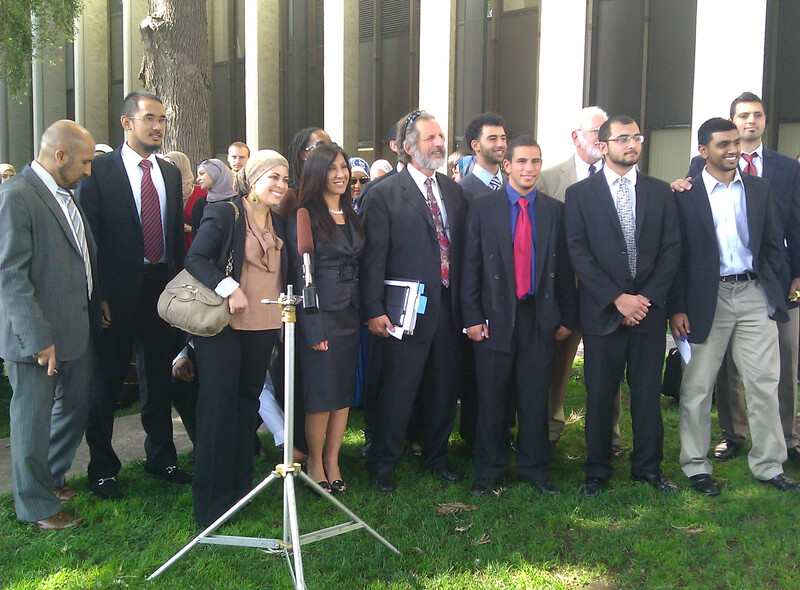Rights and Accountability 24 January 2013

Taher Herzallah, third from right, stands with members of the Irvine 11 and their lawyers following their convictions in September, 2011.
The Electronic IntifadaAppeals have been filed by lawyers representing the ten students at the University of California at Irvine and UC Riverside who were convicted in September 2011 of misdemeanor charges stemming from their vocal protest of a speech given by an Israeli official the year before.
Eleven students, dubbed the Irvine 11, were arrested when they protested Israeli ambassador Michael Oren’s speech on UC Irvine’s campus in which he defended Israel’s attacks on the Gaza Strip in 2008-09. Ten of the students were ultimately convicted of “conspiracy to disrupt a public meeting” in the Orange County superior court. The Electronic Intifada reported extensively on the court proceedings.
According to a article published yesterday in the local OC Register,
In a 77-page court document filed Tuesday, attorneys for the students contend the convictions were unconstitutional, based on trial court errors, and that prosecutors failed to prove the students violated the law.
… Superior Court Judge Peter Wilson sentenced each of the students to three years of probation, which would be cut to a year if each completed 56 hours of community service. He also ordered them to pay $270 in fines.
Prosecutors argued during trial that the defendants used a “heckler’s veto” to thwart the free-speech rights of the speaker, while the defense attorneys contended the protesters lawfully exercised their right to free speech.
… The university’s implicit rules permitted non-violent protest of speakers on campus, [defense attorney Lisa] Jaskol said in an interview.
“When you get to the explicit rules that the prosecution presented to the jury, those were unconstitutional — that the protesters had to be courteous and polite,” she said. “And that cannot be a basis for a conviction under our Constitution.”
In addition to the constitutional challenge, the students’ attorneys also argue that Wilson erred by refusing to instruct the jury that “unconstitutional ‘rules’ announced by university officials” for the ambassador’s talk “were not a valid basis for a conviction” under the statute, and by allowing prosecutors to use hearsay.
The OC Register added that Orange County prosecutors “will respond formally and a three-judge panel will hear the appeal in coming months.”
Alleviating the ripple effect
I spoke with Taher Herzallah (one of the ten convicted students) earlier today by phone and asked him if, while he and his fellow activists wait for a decision on the appeal, his Palestine solidarity activism has been thwarted or deterred by the jury’s decision since their convictions. He explained that if anything, it’s made him — and the others — more motivated.
Herzallah graduated from UC Riverside in 2011 as a political science major with an international relations emphasis. Since his graduation — and conviction — he has continued to do Palestine-related work, and currently is a full-time staff member for the Chicago-based American Muslims for Palestine as campus coordinator and West Coast regional director.
“I’m constantly doing events on Palestine, working on campuses still, and working in the community, at churches and mosques, doing different work all over the place. We do a lot of advocacy. So my Palestine activism is now my career — it hasn’t deterred me in any way,” Herzallah said.
He added that although he is “more cautious about things that I do,” he still engages in demonstrations and civil disobedience protests against Israel’s human rights violations. “It’s definitely something I will continue to do on a long-term basis.”
If the convictions are overturned in an successful appeal, Herzallah said that this would be a significant vindication of Palestine solidarity activism on campus, especially involving Arab and Muslim students, at a time when such activism is being scrutinized and students’ free speech rights on UC campuses are being threatened with legal consequences.
“One of the more negatives of this Irvine 11 case is the effect it’s had on many student activists across the country, and many people ask the question — if we were to protest this way, would we get arrested too? Would we be convicted too? And this is something that we’ve always had a question about. I think if our convictions were overturned and the appeals were successful, it’d be a huge vindication for us, and we could promote this as ‘look, if you fight the fight, you’ll be successful, you’ll be victorious at the end.’
“The message that we’re trying to send [is that] the struggle for Palestine is not a simple one, you’re not going to have a nice walk in the park, like nothing’s going to happen. It’s going to be a struggle. This is part of what we do. Of course we would prefer it not to be this way, but … it’s Palestine, it’s not an easy thing to deal with.
“But it’s something that’s becoming more popular now — the movement around it is growing, BDS [boycott, divestment and sanctions] is growing, so many other things. This would be a huge vindication for us, if we were to win this appeal. It would help us a lot in really alleviating this ripple effect that had a shock on many students when we did get convicted.”






Comments
Courteous and polite?
Permalink Philippa replied on
It's sad to see UC going down the drain in this way. They used to be respected for their academic standards. Now they sound like a quaint comedy of manners from 19th. century Virginia.